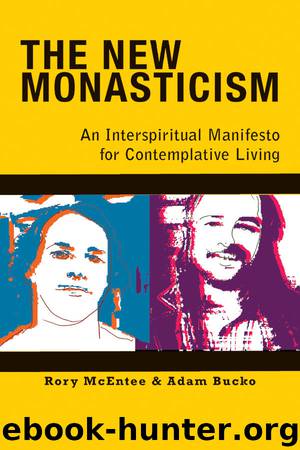The New Monasticism: An Interspiritual Manifesto for Contemplative Living by Bucko Adam & McEntee Rory

Author:Bucko, Adam & McEntee, Rory [Bucko, Adam & McEntee, Rory]
Language: eng
Format: epub
ISBN: 9781626981263
Amazon: 1626981264
Publisher: Orbis Books
Published: 2015-04-10T04:00:00+00:00
Dialogical Sophiology
We began this chapter with the introduction of a new term, dialogical sophiology. We explored the dialogical relationship in our previous chapter, and now have the context to understand sophiology as not only a positive engagement with the world, but as a “divinization by participation” in the world.125 It also connotes a democratization of the spiritual life, broadening “the traditional concept of theosis from the individual (e.g. monk, artist, prophet) to ‘all human beings living in the world.’”126 Finally, and perhaps most important, we recognize the living presence of Sophia, of Wisdom—her gifts of intuition, gentle but attractive power, and synthesizing communion—here and now, in our midst, “delighting in the human race.”127 It is from this foundation—together with a faith in the integrity and uniqueness of the other—that the new monastic builds her spiritual/theological/philosophical framework. By “other,” here we mean Wisdom or Truth found outside of own phenomenological awareness, or our personal experience, from wherever it may arise: other people; other religious, wisdom, and cultural traditions; modern scientific, psychological, and sociological insights, etc.
Dialogical sophiology is related, then, to a specific vocation that is very important to the new monastic movement, the vocation of a theologian. Just as all new monks embody various vocations in differing degrees—for we are all activists, contemplatives, artists, and, yes, as we will see, even theologians—dialogical sophiology is our term for the universal “theological” vocation of building a solid framework within which one's spiritual journey can find a home. This framework must help one to avoid pitfalls and distractions, must be informed by the great truths of the wisdom traditions, and must emerge out of one's own experience, yet in a dialogical relationship with one's mentors and sangha. Therefore, even though the framework is unique to oneself, it cannot be said to be owned or even created by one's self—for it comes into being among us, in harmony with all that we have spoken: personal experience, the wisdom of others, our religious traditions, modern scientific, psychological, and sociological insights, and the very presence and action of Wisdom, Sophia.
Each new monastic is called to be a dialogical sophiologian. This entails a reflective way of being with the other, where we remain aware that Wisdom is present, evoking her synthesizing beauty among us. This other can be persons, philosophies, religious traditions, mentors, art, political and social theory, poetry, nature. As we form and cultivate our intellectual framework we are careful to remain aware that it is not purely rational or intellectual, but it is also wedded to the heart. It develops through the lens of the heart, the depths of our humanity, and the revelations of others, including our wisdom traditions. Neither is it to be easy. We must struggle intellectually in order to actualize this integration of mind and heart. It “involves both ‘realization’ (contemplation; mystical experience) and intellectual struggle, the two movements circling and informing each other as perhaps in a fugue or carefully patterned dance.”128 In addition to realization and intellectual struggle, it involves
Download
This site does not store any files on its server. We only index and link to content provided by other sites. Please contact the content providers to delete copyright contents if any and email us, we'll remove relevant links or contents immediately.
The Secret Power of Speaking God's Word by Joyce Meyer(3182)
More Language of Letting Go: 366 New Daily Meditations by Melody Beattie(3024)
The Holy Spirit by Billy Graham(2944)
To Light a Sacred Flame by Silver RavenWolf(2814)
Tuesdays With Morrie by Mitch Albom(2754)
The Lost Art of Good Conversation by Sakyong Mipham(2651)
The Traveler's Gift by Andy Andrews(2457)
Kundalini by Gopi Krishna(2180)
A Kingsbury Collection by Karen Kingsbury(2101)
Anxious for Nothing by Max Lucado(1968)
Finding Chika by Mitch Albom(1967)
Angels of God: The Bible, the Church and the Heavenly Hosts by Mike Aquilina(1957)
Angels by Billy Graham(1922)
As a Man Thinketh by James Allen(1898)
Curse Tablets and Binding Spells from the Ancient World by Gager John G.;(1860)
The Yoga of Jesus: Understanding the Hidden Teachings of the Gospels by Paramahansa Yogananda(1849)
Autobiography of a Yogi (Complete Edition) by Yogananda Paramahansa(1824)
Barking to the Choir by Gregory Boyle(1819)
How To Be Born Again by Billy Graham(1778)
